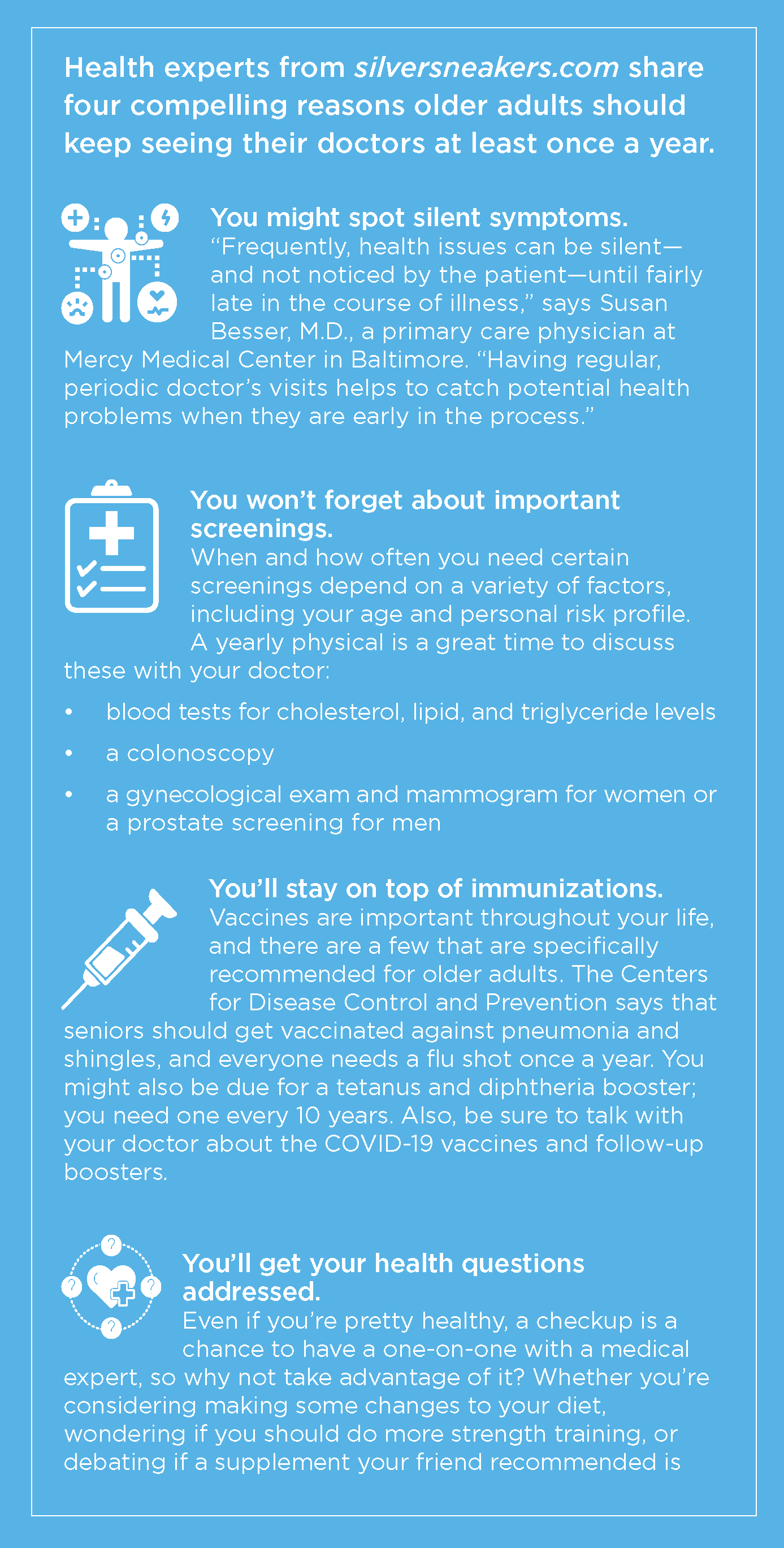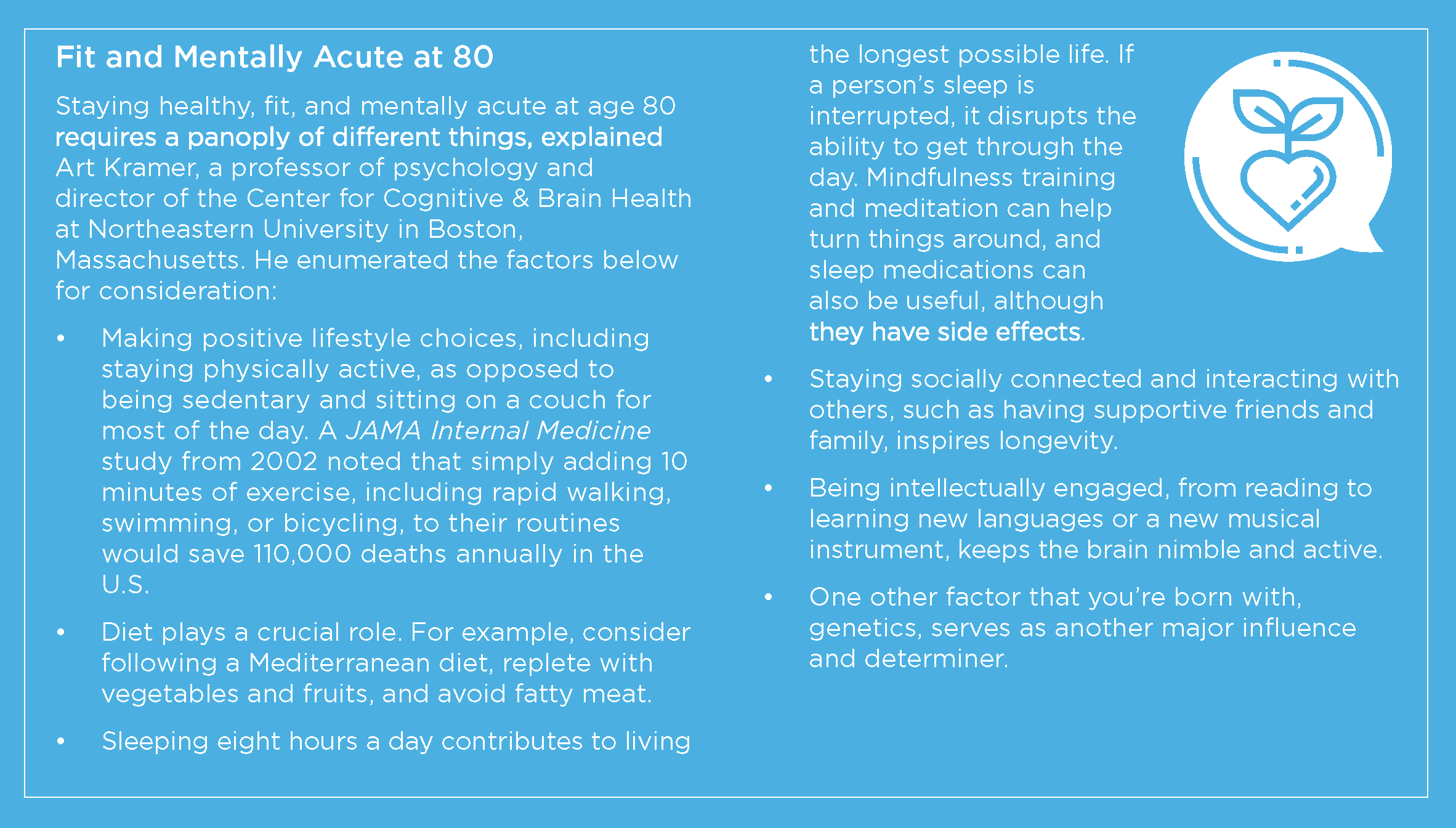Making 80 the New 60
What is even better? She is not alone. Gone are the days of seniors relegated to sitting on porches, swinging life away. There is a major demographic transformation underway, and it is a phenomenon acknowledged by more than just the medical community.
Unlike several decades ago, seniors living into their 80s has become commonplace. The Internet is replete with lists of influential over-80s who are still going strong: activist Jane Fonda (84), director Clint Eastwood (91), singer Joan Baez (81), and actress Rita Moreno (90).
In fact, in the past few years, two octogenarians helped lead the country amid the COVID-19 pandemic and the political crisis surrounding the January 6 insurrection: Anthony Fauci, immunologist and director of the National Institute of Allergy and Infectious Diseases, and Nancy Pelosi, speaker of the House of Representatives.
So what is the secret sauce to operating like a 60-year-old when you’re 20 years older? A great deal of it has to do with choice.
Make Good Choices
Experts in longevity attest to the fact that staying healthy into one’s 80s depends on making the right dietary choices, exercising, avoiding undue risks, and, of course, having a good genetic base.
But becoming a fit octogenarian starts way back in a person’s life, says S. Jay Olshansky, a professor at the School of Public Health at the University of Illinois at Chicago who specializes in aging. High school students, for example, acquire bad habits that shorten their lives, such as smoking, excessive drinking, steady drug use, or eating too much and becoming obese.
Andrew Steele, a physicist and author of Ageless: The New Science of Getting Older Without Getting Old, agrees. “Not smoking is the single most important thing you can do. Smoking can knock off 10 years of your expectancy,” he says. And then, of course, not eating too much, avoiding obesity, and getting regular exercise all heighten the chances of living longer.
Keep It Moving
Olshansky says it is critical to keep the blood flow moving. “Our body is [made up] of components that deteriorate when they’re not being used,” he says.
If you stop using your muscles, your body won’t waste the energy it needs to take care of them. Instead, your body will start to break your muscles down, which causes them to decrease in size and strength. The amount of time it takes for your muscles to atrophy depends on your age, fitness level, and cause of atrophy. If your muscle atrophy is due to disuse, the process can start within two to three weeks of when you stop using your muscles.
The good news is that disuse atrophy can be treated with regular exercise and better nutrition. Your healthcare provider may recommend physical therapy or an exercise plan. Even if you can’t actively move certain joints in your body, you can do still exercises wearing a splint or brace.
The mind also operates more efficiently when it has sufficient blood flow, Olshansky says. “The seniors who forget things are having a difficult time with the blood flow in their brain and making synaptic connections.”
Steele says more exercise also helps to sustain an active mind. “When you’re running, and your heart is beating in your chest, and you’re improving your cardiovascular muscles, you’re improving your mental health,” says Steele.
Avoid Isolation
People in their 80s who are thriving have several things in common, including a lifetime of healthful and nurturing environments, access to medical care, education, meaningful relationships, physical activity, nutrition, and engagement with people, says Linda Fried, dean of the Mailman School of Public Health at the Columbia University Medical Center in New York City. Avoiding isolation is a key ingredient, she says.
Fried’s research shows that older adults are prone to three specific kinds of loneliness. The first is brought on by a lack of intergenerational contact. “We need all age groups to interact to create meaningful lives,” Fried says.
Second, aging adults tend to feel lonely when they aren’t able to contribute to society. While others might bond with colleagues or schoolmates, the elderly are not likely to have such outlets. And finally, aging adults are prone to what Fried calls an existential loneliness, or the sense that life lacks meaning or purpose.
Older adults can take mental stock of the extent to which they feel lonely or socially isolated. Am I feeling left out? To what extent are my relationships supportive? Then, they should consider what underlies any problems. Why don’t I get together with friends? Why have I lost touch with people I once spoke with?
Find a Passion
Operating like a person 20 years younger requires finding your passion. People in their 70s are faced with a choice, says Michael Brickey, a psychologist based in Columbus, Ohio, who wrote The 52 Baby Steps to Grow Young. They can sit in front of the TV and stagnate or learn how to play bridge, swim, or line dance or can join Toastmasters and learn to give speeches, he says.

At age 76, Brickey has started to garden and learn about plants and soil. For him, gardening brings “a sense of purpose and joy and a sense of accomplishment.” Other people might find a passion in music, reading, Bible study, bike riding, making art, or pets. One way you know you’ve hit a passion is when you get so absorbed that you lose track of time and are totally immersed, says Brickey.
Monitor, Monitor, Monitor
As they age, people need to start protecting and monitoring their bodies, says Olshansky, who is 68 years old. He stopped running eight years ago and started walking because “knees and hips are hinges that don’t last forever.”
To stay fit at age 80, Olshansky’s advice is monitor, monitor, monitor. In his personal life, he sees his primary care physician, dermatologist, and eye doctor regularly for checkups that help monitor the body parts that tend to fail between 60 and 80, he says. By analogy, he says automobiles with 60,000 to 80,000 miles must be treated more carefully and brought in for repairs more often than cars with 20,000 miles.
Social and Economic Changes
Steele, who lives in Slough, a suburb of London, says that “huge social and economic changes, such as conquering infectious diseases and creation of antibiotics,” contribute to people living longer and staying healthy.
In the next few years, there will be breakthrough medications and pills that will help intervene in the aging process and help slow the process of aging, Olshansky says.
According to The Washington Post, leading the list of candidates is metformin, a longtime treatment for type 2 diabetes, and rapamycin, a chemotherapy agent and immunosuppressant. Scientists also are studying a class of compounds known as senolytics, which attack senescent cells in the body that tend to proliferate with age. Senescent cells damage healthy cells around them, contributing to multiple age-related diseases.
Super Agers
Olshansky refers to people who are physically active and mentally sharp at age 80 and super agers. “These folks all come from a family history of exceptional longevity,” says Olshansky. “They all look younger for their age.” What you’re seeing is a signal indicating that the biological rate of aging is occurring at a slower rate, he says. “They have, in short, won the genetic lottery.”
Staying youthful and active into your 80s depends on “a mixture of genetic luck, consciousness, having passions, and developing the belief and coping skills that give you a thoughtful outlook,” says Brickey.
